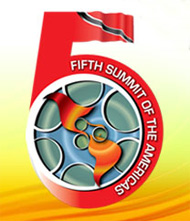By Daniel Barragan (Posted: March 9, 2009)
Del 17 al 19 de abril de 2009 se realizará la V Cumbre de las Américas en Puerto España, Trinidad y Tobago, enfocada a “Asegurar el futuro de nuestros ciudadanos promoviendo la prosperidad humana, la seguridad energética y la sostenibilidad ambiental”.
Como parte del proceso de Cumbres, la Organización de Estados Americanos (OEA) ha venido promoviendo la participación de la sociedad civil de las Américas a través de una serie de foros subregionales en Puerto España (octubre 2008), San Salvador (diciembre 2008) y Lima (febrero 2009); y un foro hemisférico en Washington D.C.(marzo 2009).
Estos espacios de participación para la sociedad civil fueron muy importantes para poder analizar y debatir la propuesta de resolución que adoptarán los gobiernos del continente en abril próximo, y definir propuestas concretas para enriquecer esta declaración.Justamente en estos espacios ha sido relevante el rol de las organizaciones miembros de la Iniciativa de Acceso, que han logrado incidir en este proceso en dos vías:
(i) Centro Ecuatoriano de Derecho Ambiental (CEDA), AC Consorcio Desarrollo y Justicia y Corporación Participa, incidieron para incorporar en las recomendaciones del Foro Subregional de América del Sur (Lima), a los derechos de acceso, ya no como un reconocimiento expreso por parte de los gobiernos, sino como una garantía por parte de los Estados para su implementación. La propuesta insertada en el párrafo 44 del documento de recomendaciones dice:
“También trabajaremos en aras de promover una gobernabilidad ambiental sana, mediante el refuerzo de las leyes ambientales nacionales y creando capacidad institucional para la gestión democrática de los recursos naturales, garantizando el acceso de los ciudadanos a la información ambiental, a la participación en los procesos de toma de decisiones y a mecanismos de justicia ambiental. De igual forma, los gobiernos nos comprometemos a desarrollar un sistema de indicadores ambientales orientados a monitorear la información y justicia ambiental, en coordinación con la sociedad civil.”
De igual forma esta propuesta fue apoyada y promovida por los socios TAI presentes en el Foro Hemisférico (Washington D.C.) realizado el pasado 3 y 4 de marzo: World Resources Institute (Estados Unidos), Corporación Participa(Chile), Centro Ecuatoriano de Derecho Ambiental (Ecuador), AC Consorcio Desarrollo y Justicia (Venezuela) y FUNPADEM (Costa Rica); logrando que conste en el documento de recomendaciones de este Foro.
(ii) Adicionalmente, la Iniciativa de Acceso estuvo presente en dos espacios en el Foro Hemisférico de la Sociedad Civil (Washington D.C.). El primer espacio estuvo dentro del panel de Seguridad energética y sostenibilidad ambiental, en el que Linda Shaffer difundió la Iniciativa de Acceso y habló sobre los fundamentos de la gobernabilidad ambiental que son el corazón de nuestro proceso.
El segundo espacio tuvo lugar en la Sesión Especial de la Comisión de Gestión de Cumbres Interamericanas y Participación de la Sociedad Civil en las actividades de la OEA, en donde el Centro Ecuatoriano de Derecho Ambiental presentó a la Iniciativa de Acceso y el trabajo que desarrollamos como un mecanismo de apoyo al seguimiento de los mandatos de cumbres en los temas ambientales.
Fue muy importante la presencia de la Iniciativa de Acceso en estos espacios, a través de sus miembros presentes, no solo para reforzar nuestra presencia institucional y liderazgo en los procesos de gobernabilidad ambiental, sino para poder incidir en foros políticos y procesos de desarrollo de políticas públicas.
The Access Initiative in the V Summit of the Americas process
From April 17 to 19, 2009 will be held the V Summit of the Americas in Port of Spain, Trinidad and Tobago, aimed at “Securing Our Citizens’ Future by Promoting Human Prosperity, Energy Security and Environmental Sustainability”.
As part of the Summit, the Organization of American States (OAS) has been promoting the participation of civil society in the Americas through a series of subregional forums in Port of Spain (October 2008), San Salvador (December 2008) and Lima (February 2009) and a hemispheric forum in Washington DC (2009 March).
These spaces for civil society were very important to analyze and discuss the proposed resolution to adopt the governments of the continent in April, and define concrete proposals to enhance this statement. Precisely in these areas has been relevant the role of TAI members, who influenced this process in two ways:
(i) Centro Ecuatoriano de Derecho Ambiental (CEDA), AC Consorcio Desarrollo y Justicia and Corporación Participa influenced to incorporate in the recommendations of the Sub-Regional Forum of South America (Lima), the access rights, not as an explicit recognition by governments, but as a guarantee by the States for their implementation. The proposal inserted on paragraph 44 of the document reads:
“We will also work towards promoting sound environmental governance by strengthening national environmental laws and building institutional capacity for the democratic management of natural resources, guaranteeing citizens access to environmental information, to participation in decision-making processes, and to mechanisms for environmental justice. In addition, the governments commit to developing a system of environmental indicators geared toward monitoring environmental information and justice, in coordination with civil society.”
The proposal was also supported and promoted by TAI partners in the Hemispheric Forum (Washington DC) held on March 3 and 4: World Resources Institute (Estados Unidos), Corporación Participa (Chile), Centro Ecuatoriano de Derecho Ambiental (Ecuador), AC Consorcio Desarrollo y Justicia (Venezuela) y FUNPADEM (Costa Rica); achieving the inclusion in the document of recommendations of this Forum.
(ii) Additionally, the Access Initiative was present at two spaces in the Civil Society Hemispheric Forum (Washington DC). The first space was on the panel on Energy security and environmental sustainability, in which Linda Shaffer introduced the Access Initiative and spoke about the foundations of environmental governance that are the heart of our process.
The second space was in the Special Session of the Committee on Inter-American Summits Management and Civil Society Participation in OAS Activities, in which the Ecuadorian Center of Environmental Law (Centro Ecuatoriano de Derecho Ambiental) presented the Access Initiative process and the work we develop as a support mechanism to follow the summits mandates on environmental issues.
It was very important the presence of the Access Initiative in these spaces, through its members present, not only to strengthen our institutional presence and leadership in environmental governance processes, but in order to influence policy forums and of public policy development processes.
Más información / more information:
http://www.civil-society.oas.org/Default.htm
http://fifthsummitoftheamericas.org/home/

